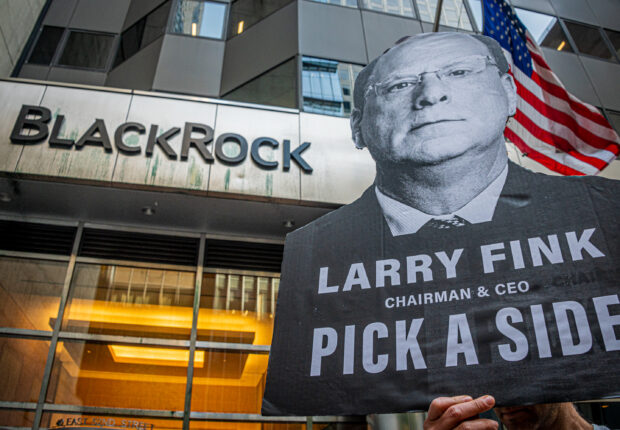A new report from Majority Action, released yesterday, shows that BlackRock used its huge voting power as a major shareholder to undermine climate initiatives in industries with huge climate impacts.
A new report from Majority Action, released yesterday, shows that BlackRock used its huge voting power as a major shareholder to undermine climate initiatives in industries with huge climate impacts.
BlackRock is the world’s largest asset manager and one of the largest shareholders in nearly every significant publicly traded corporation in the country–including the fossil fuel giants driving the climate crisis. This gives it massive shareholder voting power which it can use to either push change in the industries driving the climate crisis, or allow business as usual to continue. This year BlackRock chose business as usual, which spells climate disaster.
As we all know, many of the worst carbon-emitting companies continue to ignore the extreme consequences of climate change. The urgency has never been more clear with wildfires raging in the West, rounds of hurricanes beating the South, and ice sheet melt matching the worst-case scenarios. There are two key ways that BlackRock can use its massive voting power to create change. It can vote out the boards of companies that aren’t taking action on climate, and it can vote for climate resolutions proposed by shareholders to change how companies operate.
Majority Action’s report shows that Blackrock voted in favor of 99% of company-proposed directors in the U.S. across the energy, utility, banking, and automotive sectors. Worse still, BlackRock voted overwhelmingly against the climate-critical resolutions at S&P 500 companies reviewed in the report. BlackRock supported just three of the 36 resolutions. At least 15 of these critical climate votes would have received majority support if BlackRock, along with Vanguard, had voted in favor of them.
This terrible voting record comes just months after CEO Larry Fink declared that BlackRock would put climate change at the center of its investment strategy.
One of the resolutions BlackRock voted against would have held JPMorgan Chase’s board accountable for its role as the world’s largest fossil fuel financier. At the same time, BlackRock voted for Lee Raymond, the notorious climate denier, to remain on Chase’s board.
In early 2020 BlackRock made a big show of joining Climate Action 100+, an investor initiative to ensure the world’s largest corporate greenhouse gas emitters take necessary action on climate change. But then BlackRock turned around and voted against 10 of the 12 shareholder proposals flagged by the coalition.
In contrast, other large asset managers are choosing to do the right thing. Legal & General Investment Management and PIMCO had the highest rate of voting against directors in the energy, utility, banking and automotive sectors and they supported all of the shareholder proposals analyzed in the study.
It’s clear that BlackRock could be a climate leader that creates real change across the financial and corporate world. But right now the financial giant is trying to make a big show of a few baby steps and ultimately failing on its climate promises.

